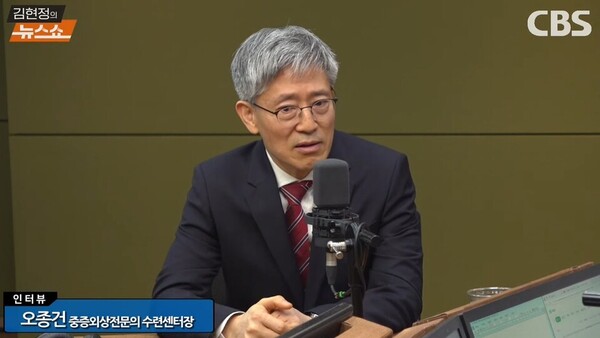"I watched it reluctantly, knowing I couldn't ignore it. As expected, it was difficult to watch."
Dr. Oh Jong-keon, director of the Severe Trauma Specialist Training Center at Korea University Guro Hospital, shared his thoughts after watching the Netflix drama, "The Trauma Code: Heroes on Call." Oh is an orthopedic surgeon and a specialist in traumatology.

Korea's first and only severe trauma training center was in danger of closing after the government cut its budget by 900 million won ($619,024). The center barely escaped the shutdown, as the Seoul Metropolitan Government provided 500 million won in disaster management support.
In Korea, there are 335 subspecialists in traumatology, also known as severe trauma specialists. To become a severe trauma specialist, specialists in surgery, cardiovascular and thoracic surgery, neurosurgery, and orthopedics must undergo two years of training in traumatology and acquire the qualification of a subspecialist.
“I watched the first and second episodes of (Netflix drama) ‘The Trauma Code’ after a financial crisis broke out at my center. I did so reluctantly because I couldn't help it,” he said. “In the drama, they made fools of many people working around the protagonist to make him a hero. One person who was made a fool was an orthopedic surgeon who treated fractures. As expected, I felt distressed.
In the drama, the episode ends when the patient's “vital signs” stabilize, but that's not the case in real life, Oh said.
“Once the vital signs are stabilized and the patient is alive, the treatment begins earnestly. That part is not dramatic or dynamic, and the patient lives if you do a good job at that moment,” he said.
In the drama, “genius surgeon Baek Kang-hyuk” saves the patient. Still, he said it takes a team of medical professionals in real life.
“Teamwork is what we emphasize the most. We have trauma, orthopedics, and neurosurgery, but their roles and goals differ,” Dr. Oh said. “We emphasize teamwork, but there are a lot of conflicts between them. We have 30 people in the trauma team's chat room. It also takes a long time to form teamwork among them.
There is also a sense of urgency that the center could be shut down anytime.
“It is not a legal institution but a budgeted program. Every year, we've been living in fear of what will happen if no trainees come in, and that's what happened this time (the budget cut),” Oh said.
“Severe trauma patients are relatively underprivileged people,” Oh said. “Please speak up like now so we can see them well and have a system in place. I hope this is not a one-off topic.”
Related articles
- Netflix drama ‘The Trauma Code’ sparks financial CPR for Korea’s trauma training center
- [Reporter's Notebook] Trauma patients’ survival shouldn’t depend on luck
- [Interview] Doctor-turned-author of ‘The Trauma Code’ laments Korea’s collapsing trauma system
- [Interview] Netflix drama ‘The Trauma Code’ is fiction. The real crisis in Korea’s ERs is worse.
- Ewha Womans University Medical Center stars as key filming location for Netflix’s ‘The Trauma Code’
- Emergency medicine doctors’ health in crisis amid ongoing government-medical conflict
- Orthopedists' group urges overhaul of severity classification as hospital reforms squeeze care
- [Reporter's Notebook] Regional trauma centers remain mere ‘political symbols'

